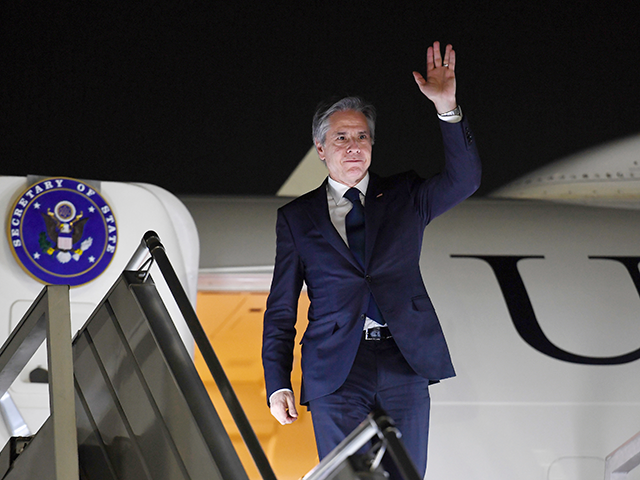India’s delicate balancing act between the Western world and Russia was put to another tightrope test on Wednesday, as both U.S. Secretary of State Antony Blinken and Russian Foreign Minister Sergei Lavrov arrived in New Delhi for this week’s G20 meeting.
The Times of India (TOI) reported “a meeting was seen as unlikely between the two men, who have not been in the same room since a G20 meeting in Bali in July – when, according to Western officials, the Russian foreign minister walked out.”
The G20 summit, where current president India hoped to burnish its credentials as leader of the “Global South” bloc of developing nations, promises to be awkward because Lavrov rode into town spoiling for a fight.
The Russian Foreign Ministry heralded Lavrov’s appearance by claiming the West is only slapping sanctions on Russia because it desires “revenge for the inevitable disappearance of the levers of dominance from its hands.”
“The destructive policy of the U.S. and its allies has already put the world on the brink of a disaster, provoked a rollback in socio-economic development, and seriously aggravated the situation of the poorest countries,” the Russian Foreign Ministry gusted, having apparently forgotten who invaded which country a year ago.
TOI expected Blinken to get a frosty reception from Russia’s lone major-power ally, China, whose Foreign Minister Qin Gang is also in New Delhi. Relations between the Biden administration and China are tense after the Chinese spy balloon saga, and because the U.S. is increasingly concerned China will offer material support to the Russian invasion of Ukraine.
“India wants its G20 presidency this year to focus on issues such as alleviating poverty and climate finance, but the Ukraine war and its effects are set to dominate the agenda,” TOI mournfully predicted.
Last week’s meeting of G20 finance ministers in Bengaluru could not even produce a joint statement on the Ukraine invasion because Russia and China nixed everything critical. The conferees in New Delhi appear to be ready for such obstructionism, as the U.S. and key allies like Japan and Australia are planning to huddle up and work on strategy.
India might not be invited to that huddle, but European Union foreign policy head Josep Borrell strongly hinted that the U.S. and Europe expect India to use its good relations with Moscow to “make Russia understand that this war has to finish.”
India still refused to denounce the Russian invasion on Wednesday. Foreign Secretary Vinay Kwatra acknowledged it will be “an important point of discussion during the Foreign Ministers’ meeting,” but said India’s position will be a generic and platitudinous insistence that “this isn’t an era of war.”
“Dialogue and diplomacy are the way forward. The agenda is for the foreign ministers to discuss in the meet,” Kwatra said, expressing some doubt that any sort of joint statement on the war would be issued.
“Issues of the impact of the Russia-Ukraine conflict on the world, including economic impact and impact on development, will also be focused upon in the meeting,” he said.
Blinken arrived in New Delhi from Kazakhstan, where he met with Central Asian leaders to assure them America will continue to support their “sovereignty, territorial integrity, and independence” as Russia grows more aggressive.

COMMENTS
Please let us know if you're having issues with commenting.